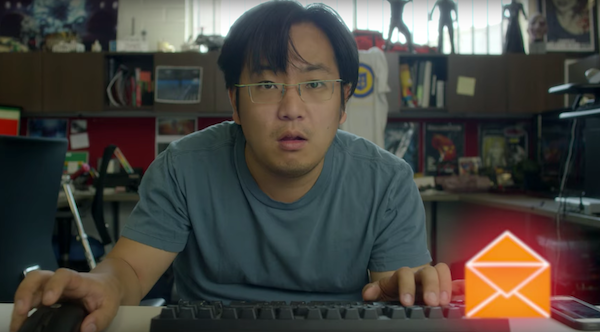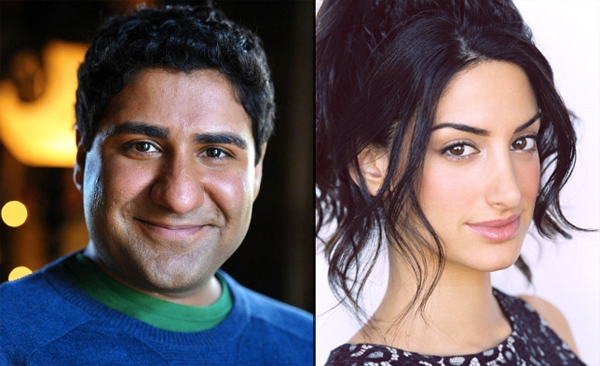Freddie Wong is a creator, writer, producer, director, filmmaker and competitive gamer. The multi-hyphenate grew up with a love for watching films and began uploading videos on YouTube with his friends, eventually gaining a following with content that blended comedy, action, and video games. He and his partners later formed production company RocketJump, which maintains multiple YouTube channels (the RocketJump channel alone has over 7.7 million subscribers), including the Video Game High School series.
Kore: What were the biggest obstacles starting out?
Freddie Wong: The difficulty was we were doing everything ourselves. We took who we had around … we were trying to hold ourselves, and tried to keep on a schedule with it.
K: What was your initial goal when starting RocketJump in 2011?
FW: It’s different now, with tons of YouTube money. But we were just a bunch of people making videos, that’s what we got into it to do. I grew up with Blockbuster video, grew up watching movies. We just wanted to try it and potentially build up an audience that would allow us to do more stuff later.
For us it was all about having a place to practice making movies, generate, and build an audience, and hopefully people were fans of our work. Obviously a lot has changed. Over time it became easier, with Film School. We developed a voice, an audience. We would find people who were like-minded. We had an open, collaborative mindset. In that way, it’s allowed us to grow very tight-knit with something fun.
K: Were there any naysayers along the way?
FW: More like, “I don’t get it, and what’s the point”? People are so skeptical – “I don’t know how I feel about this.” … [a] new form of entertainment is dangerous a thing to do. The old guard of entertainment [will say], “Well, why?” Why not? There’s no “this is how entertainment has to be, forever and ever.” Writing off digital, and video games, etcetera. You ignore that at your own peril.
K: What would you be doing if you weren’t a creator and producer?
FW: Something in computer science. [I’m] definitely a huge programming nerd. Probably engineering or design.
MK: Did your parents ever try to steer you in a different direction?
FW: I never had a pushback. I think my parents were, “If this is something you like doing…find a way of making money from it.” They were very pragmatic. With my brother and I, they never tried to force us down to more traditional moneymaking, lucrative paths.
K: Do you ever have any doubts about what you’re creating?
FW: The push-and-pull comes from what your audience wants you to do. Over time, everyone gets sick of something. Maybe it’s not something your audience will get behind. That’s part of the deal you strike when you want to be a filmmaker. It’s out there, in that way. You can’t also just pander to your audience.
We have three seasons of “Video Game High School,” and there’s the audience demand, but for us, that story is done. But the universe is definitely interesting, we want to continue playing in it. As an animated series, it’s a new story, new characters, new games, that they play. Sort of a balancing act there.
K: Have you ever been conflicted about your creative vision and what your audience wanted?
FW: A lot of your values comes from numbers, right? Followers, subscribers — we base worth 100 percent on that, and that is kind of foreign to the entertainment world. … Netflix doesn’t release numbers, good show or not, so no one knows if this show got so many more views — the discussion is not about numbers, but artistic merit. That is the sort of trade-off, in terms of working the space that we do. We’re very much in the forefront of audience growth and audience numbers. It’s very easy to be lured in by that and chase those numbers.
K: Have you ever followed your interest, that went against what your audience wanted?
FW: Definitely. It’s pragmatic, fortunately, in that I love action, comedy, visual effects. Luckily that’s a pretty broad spectrum. For example, one of the shorts we did, everyone was 100 percent behind it. We knew going into it [that] there’s going to be a portion of the audience that is not down with it. It’s two girls fighting over a fan fiction. We realized there are going to be a lot of people uncomfortable with it. There’s a Star Wars fight, and two dudes making out. The story’s good, interesting, and you generally don’t hear the point-of-view of fandom from the female side. We loved the short, the script, the story; we had to get behind it.
K: Where do you and your team work?
FW: Our offices are in Burbank and Downtown LA.
K: Any upcoming projects?
FW: An animated show, a follow-up to our live action. We’re also working on developing a couple of things. A range of scripted, unscripted, narratives, and friends of the RocketJump family we’re working with to tell interesting stories. With Film School [one of RocketJump’s channels], it’s nice to have a place to really talk about filmmaking, storytelling, and the how, the tutorials, and the why. It’s engaging and it’s media literacy and grammar.
K: Do you have any advice for other Youtube creators and filmmakers?
FW: Make things for yourself, first and foremost. Don’t make other things you think other people want to see … That’s a path for disaster.
Wong is featured in Kore Asian Media’s 2016 annual print issue. Order your copy now — it’s FREE!: https://charactermedia.com/subscribe







